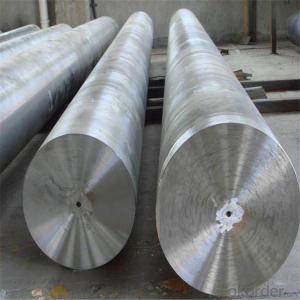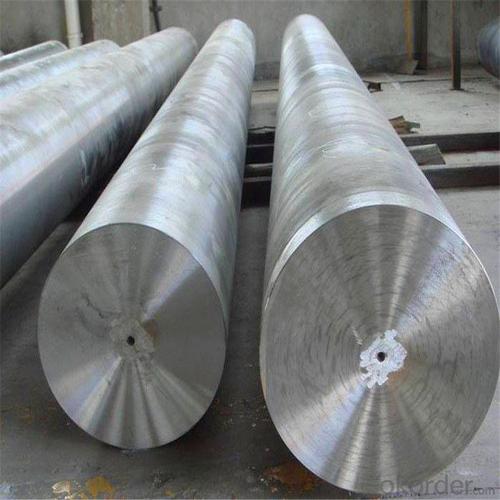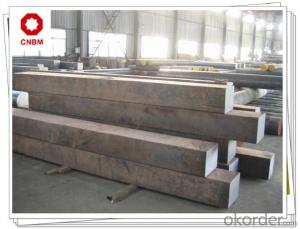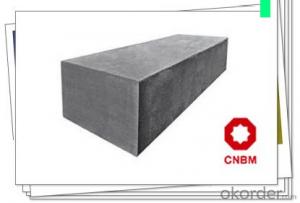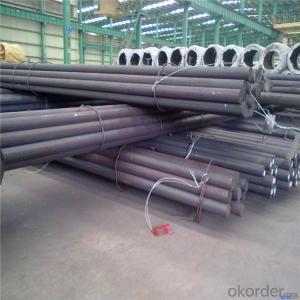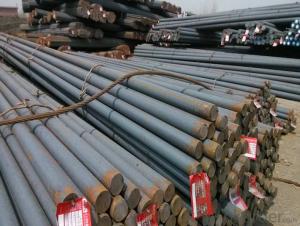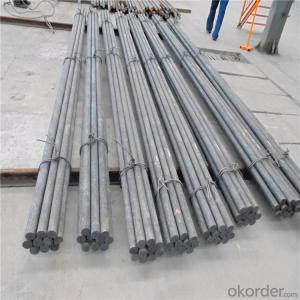Forged S20C Square Steel Bar Carbon Steel
- Loading Port:
- Tianjin
- Payment Terms:
- TT OR LC
- Min Order Qty:
- 100 m.t.
- Supply Capability:
- 500000 m.t./month
OKorder Service Pledge
OKorder Financial Service
You Might Also Like
Specification
Forged S20C Square Steel Bar Carbon Steel
Product Description of Forged S20C Square Steel Bar Carbon Steel
1. Steel grade: SAE1020, 20#, C22, S20C
2. Length: 6M-12M
3. Diameter: 16mm-300mm
4. Product range: round bar, flat bar, square bar
5. Technique: Hot rolled, forged, cold drawn
Specification of MS Mild Steel SAE1020 Hot Rolled Round Bar
Material | S20C | Round bar | Dia(mm) | 16-300mm |
Process | EAF + LF + VD + Forged + Heat Treatment (optional) | Length (mm) | Max 12m | |
Heat treatment | Normalized / Annealed / Quenched / tempered | Flat bar | Thickness(mm) | 8-500mm |
Delivery condition | Hot forged +Rough machined (black surface after Q/T)+ Turned (optional) | Width(mm) | 70-200mm | |
Test | Ultrasonic test according to SEP 1921-84 D/d | Length (mm) | Max 12m |
Chemical Composition of Forged S20C Square Steel Bar Carbon Steel
C | Si | Mn | Cr | Ni | Cu |
0.17~0.23 | 0.17~0.37 | 0.35~0.65 | ≤0.25 | ≤0.30 | ≤0.25 |
Photo Show of Forged S20C Square Steel Bar Carbon Steel
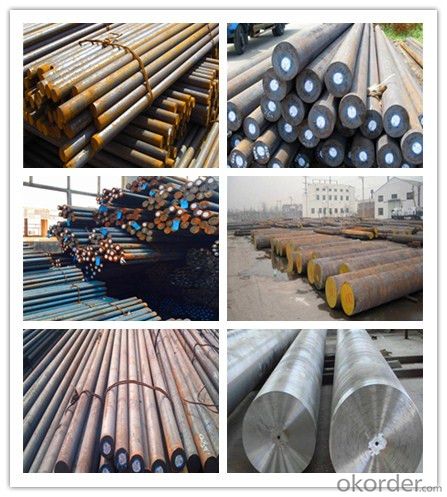
Packing and Delivery:
Packing in bundle package, or as customer's requirements.
Delivery Detail: 45 days after receiving the deposit.
Usage and Applications of Forged S20C Square Steel Bar Carbon Steel
1. Steel round bar is used in a large number of architectural and engineering structures. Or it can be used in construction of plants for the production of steel house frames, high-voltage transmission towers, bridges, vehicles, boilers, containers, ships, etc.
2. And we can use this kind of product on the performance of the mechanical parts if the demand is not very high.
3. Some special material steel round bar can be used for main shaft of steamer, hummer shank, with big section and supper force.
Company Information
CNBM International Corporation is the most important trading platform of CNBM group.
Whith its advantages, CNBM International are mainly concentrate on Cement, Glass, Iron and Steel, Ceramics industries and devotes herself for supplying high qulity series of refractories as well as technical consultancies and logistics solutions.


F A Q
1, Your advantages?
professional products inquiry, products knowledge train (for agents), smooth goods delivery, excellent customer solution proposale
2, Test & Certificate?
SGS test is available, customer inspection before shipping is welcome, third party inspection is no problem
3, Factory or Trading Company?
CNBM is a trading company but we have so many protocol factories and CNBM works as a trading department of these factories. Also CNBM is the holding company of many factories.
4, Payment Terms?
30% TT as deposit and 70% before delivery.
Irrevocable L/C at sight.
5, Trading Terms?
EXW, FOB, CIF, FFR, CNF
6, After-sale Service?
CNBM provides the services and support you need for every step of our cooperation. We're the business partner you can trust.
For any problem, please kindly contact us at any your convenient time.
We'll reply you in our first priority within 24 hours.
- Q: Can steel round bars be used in the electronics industry?
- Although steel round bars are not commonly used in the electronics industry due to their limited applications and low electrical conductivity, they can still find some utility in this field. Instead of being utilized in electronic components or circuitry, materials with high electrical conductivity like copper or aluminum are typically preferred. These materials allow for efficient transmission of electrical signals and minimize losses. Nonetheless, steel round bars can serve various purposes in the electronics industry. They can be employed for structural functions, providing support or reinforcement to electronic equipment or enclosures. Additionally, they can be utilized in the manufacturing of different mechanical components, connectors, or fixtures used in electronics assembly. Furthermore, steel round bars can be applied in the construction of equipment racks, shelves, or storage systems for electronic devices. In summary, although steel round bars are not directly involved in the electrical aspects of the electronics industry, they still play crucial roles in terms of structural support and mechanical components.
- Q: Can steel round bars be used in corrosive environments?
- The suitability of steel round bars in corrosive environments depends on the specific type of steel and the severity of the corrosion. For instance, stainless steel round bars are well-known for their excellent resistance to corrosion and are widely used in corrosive environments like marine applications, chemical processing plants, and wastewater treatment facilities. These bars are typically alloyed with elements such as chromium and nickel, which create a protective layer on the surface of the steel, preventing corrosion. On the other hand, carbon steel round bars are more susceptible to corrosion and may not be appropriate for highly corrosive environments unless they are properly coated or treated. In such situations, it is crucial to seek advice from experts or engineers to select the right steel grade and take necessary precautions to ensure the durability and performance of steel round bars in corrosive environments.
- Q: Can steel round bars be used in the hospitality industry?
- Yes, steel round bars can be used in the hospitality industry. They can be utilized for various applications such as constructing furniture, fixtures, and equipment, as well as for structural purposes in buildings and facilities. Steel round bars offer durability, strength, and versatility, making them suitable for use in various hospitality settings such as hotels, restaurants, and entertainment venues.
- Q: Can steel round bars be used for making rebar?
- Using steel round bars to make rebar is not possible. Rebar, also known as reinforcing bar, is purposely designed and produced with deformations or ribs on its surface to enhance the connection with concrete. These deformations provide improved grip and prevent slipping between the rebar and concrete, thereby enhancing the structural strength of a reinforced concrete structure. Conversely, steel round bars possess a smooth surface and do not have the required deformations, rendering them unsuitable for rebar purposes. It is crucial to utilize rebar that meets the necessary standards and specifications in order to guarantee the safety and longevity of the concrete structure.
- Q: How are steel round bars tested for quality?
- Steel round bars are tested for quality through various methods such as visual inspection, dimensional checks, surface defects detection, mechanical testing, and chemical analysis. These tests ensure that the steel bars meet the required standards for strength, durability, and composition, ensuring their suitability for specific applications.
- Q: What are the typical yield strengths of different grades of steel round bars?
- The yield strength of steel round bars can vary depending on the specific grade of steel. Here are some typical yield strengths for different grades of steel round bars: - Mild steel round bars typically have a yield strength of around 250 MPa (megapascals) or 36,000 psi (pounds per square inch). - Carbon steel round bars can have a yield strength ranging from 350 to 550 MPa or 50,000 to 80,000 psi. - Alloy steel round bars, such as 4140 or 4340, generally have higher yield strengths compared to mild or carbon steel. The yield strength of these alloys can range from 550 to 850 MPa or 80,000 to 120,000 psi. - Stainless steel round bars come in various grades, and their yield strengths can vary accordingly. For example, austenitic stainless steels like 304 or 316 typically have yield strengths ranging from 200 to 300 MPa or 29,000 to 43,000 psi. On the other hand, duplex stainless steels like 2205 or 2507 can have higher yield strengths ranging from 450 to 650 MPa or 65,000 to 95,000 psi. It is important to note that these values are just typical ranges, and the actual yield strength of a specific grade of steel round bar may differ based on factors such as heat treatment, manufacturing process, and other variables. Therefore, it is always recommended to consult the manufacturer's specifications or industry standards for accurate and precise yield strength values of steel round bars.
- Q: What is the difference between a smooth and a precision ground steel round bar?
- A smooth steel round bar refers to a steel rod that has a plain surface without any specific surface treatment or finishing process. It is typically produced through hot rolling or cold drawing methods, resulting in a basic cylindrical shape with a relatively rough surface texture. Smooth steel round bars are commonly used in various applications where a smooth exterior finish is not a critical requirement. On the other hand, a precision ground steel round bar undergoes an additional manufacturing process to achieve a more precise and refined surface finish. The precision grinding process involves removing any imperfections or irregularities from the surface of the steel rod, resulting in a highly smooth and polished finish. This process ensures that the diameter of the round bar remains consistent along its length and that the surface has a superior level of finish and accuracy. Precision ground steel round bars are widely used in applications that demand tight tolerances, precision machining, or where a smooth and polished surface is essential. Industries such as aerospace, automotive, tooling, and manufacturing often rely on precision ground steel round bars for their high-quality surface finish, dimensional accuracy, and reliable performance. In summary, the main difference between a smooth and a precision ground steel round bar lies in the surface finish and level of precision achieved. While a smooth steel round bar has a basic, rough surface texture and is suitable for general applications, a precision ground steel round bar undergoes additional grinding processes to achieve a highly smooth, polished, and accurate surface finish, making it ideal for applications requiring tight tolerances and precision machining.
- Q: Can steel round bars be used for making crankshafts?
- Crankshafts can be made using steel round bars, which are known for their high strength, durability, and ability to withstand the stress and load of engine operation. Steel is a preferred material for crankshafts because it provides a solid and reliable foundation for the rotating assembly. The round shape of the bars allows for easy machining and shaping to achieve the desired crankshaft design. Furthermore, steel can be heat-treated to improve its mechanical properties, including hardness and fatigue resistance, making it perfect for the demanding conditions and high-performance needs of crankshafts in different engine applications.
- Q: Can steel round bars be used for making cooling system components?
- Yes, steel round bars can be used for making cooling system components. Steel is a versatile and durable material that can withstand high temperatures and pressures, making it suitable for cooling system applications. Steel round bars can be machined to specific dimensions and shapes required for different cooling system components such as pipes, fittings, valves, and heat exchangers. Additionally, steel has excellent thermal conductivity, allowing for efficient heat transfer in cooling systems. However, it is important to consider the specific requirements of the cooling system and consult with engineers or professionals in order to select the appropriate grade of steel and ensure compatibility with other system components.
- Q: What is the difference between a hot-rolled and a forged steel round bar?
- The manufacturing process and resulting properties distinguish a hot-rolled steel round bar from a forged one. Hot-rolled steel round bars are created by heating a steel billet or ingot to a high temperature and shaping it with rollers. This method allows for large-scale production and the creation of various sizes and shapes. As the steel is heated and shaped, it undergoes significant deformation and recrystallization, resulting in a uniform grain structure. Hot-rolled steel round bars have a rougher surface finish and may have different levels of internal stress due to the cooling process. They are commonly used in construction, manufacturing, and general fabrication where strength and cost-effectiveness are important. In contrast, forged steel round bars are manufactured by applying extreme pressure to a heated steel billet or ingot, often using a hammer or press. This process produces a much stronger and more durable product compared to hot-rolled steel. The intense pressure during forging aligns the grain structure of the steel, leading to improved mechanical properties such as increased strength, toughness, and resistance to fatigue and impact. Moreover, the forging process eliminates internal voids and porosity, making forged steel round bars more reliable and less prone to failure. Given the high level of customization and precision involved in forging, these round bars find extensive use in critical applications that demand superior strength and performance, such as aerospace, automotive, and oil and gas industries. In summary, the primary distinctions between hot-rolled and forged steel round bars arise from their manufacturing processes and resulting properties. Hot-rolled steel offers cost-effectiveness and a wide range of sizes and shapes, while forged steel provides superior strength, durability, and reliability. The choice between the two depends on the specific application and desired performance characteristics.
Send your message to us
Forged S20C Square Steel Bar Carbon Steel
- Loading Port:
- Tianjin
- Payment Terms:
- TT OR LC
- Min Order Qty:
- 100 m.t.
- Supply Capability:
- 500000 m.t./month
OKorder Service Pledge
OKorder Financial Service
Similar products
Hot products
Hot Searches
Related keywords
